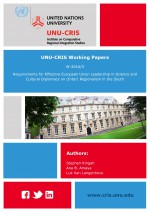How Regional and Global Development Banks Responded to the Financial Crisis
The purpose of this paper is to explore the direction of the debate within the UN on the nature of UN-regional organisational cooperation in the post-Cold War security environment and its future implications. Based on lessons learned from the experience of post-Cold War peace operations, this paper tries to address the following three issues: firstly, it re-examines the post-Cold War UN peace operations principles based on several important UN peace operations documents which have informed the overall debate on UN peace operations, including An Agenda for Peace, the Brahimi Report, the report of the ‘High-level Panel on Threats, Challenges and Change’ A more secure world, and the Secretary-General’s 2005 report In larger freedom. Secondly, it examines the lessons learned in these reports based on the experience of the post-Cold War peace operations, their recommendations for future peacekeeping operations, and subsequently their implication for global-regional security architecture. Lastly, the paper examines how such security architecture would be able to contribute to improving the even more difficult security situations in the post-9/11 era and to promoting effective conflict prevention and peace-building, while at the same time endeavouring to protect the basic human rights and security needs of individuals. The purpose of this paper is to explore the direction of the debate within the UN on the nature of UN-regional organisational cooperation in the post-Cold War security environment and its future implications. Based on lessons learned from the experience of post-Cold War peace operations, this paper tries to address the following three issues: firstly, it re-examines the post-Cold War UN peace operations principles based on several important UN peace operations documents which have informed the overall debate on UN peace operations, including An Agenda for Peace, the Brahimi Report, the report of the ‘High-level Panel on Threats, Challenges and Change’ A more secure world, and the Secretary-General’s 2005 report In larger freedom. Secondly, it examines the lessons learned in these reports based on the experience of the post-Cold War peace operations, their recommendations for future peacekeeping operations, and subsequently their implication for global-regional security architecture. Lastly, the paper examines how such security architecture would be able to contribute to improving the even more difficult security situations in the post-9/11 era and to promoting effective conflict prevention and peace-building, while at the same time endeavouring to protect the basic human rights and security needs of individuals.

